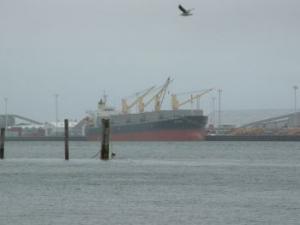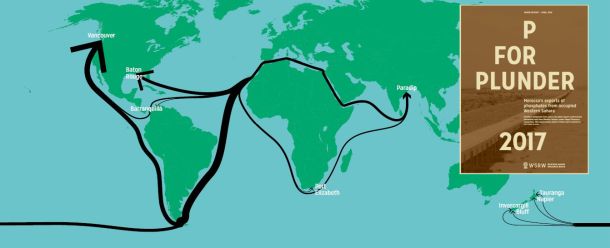
The third “Norwegian” shipping company in half a year says it will not longer visit ports in occupied Western Sahara. Jinhui Shipping, registered on Oslo Stock Exchange, says to South China Morning Post that it will not contract any more business in the country.
By Erik Hagen
Norwatch
5 June 2008
In February, Norwatch wrote about the Hong Kong based shipping company Jinhui Shipping, that was involved in transporting phosphates from Western Sahara, occupied by Morocco. The company is registered on only place in the world: Oslo Stock Exchange. The trade is in violation of advice from the Norwegian Ministry of Foreign Affairs, and with the wishes of the people of Western Sahara, the Sahrawis. Norwatch has shown video footage from New Zealand, showing the phosphates being discharged.
It was the daily newspaper South China Morning Post (SCMP) that in May noticed Norwatch’s coverage of the shipping company, and SCMP succeeded in something that Norwatch has not managed: getting a comment from the company’s management.
'Being headquartered in Asia, we confess we knew nothing about Western Sahara. We've only had this one charter ... but now that we understand the issue we will not directly contract any more business out of there,' Jinhui Shipping vice-president, Raymond Ching promised to SCMP.
Ching explained to SCMP that the vessel, ’Jin Cheng’ was bought from another shipping line last year and came with a contract arranged by the previous owner that Jinhui had an obligation to fulfil.
Thereby, Jinhui confirms signals that the company put forward during the presentation of its fourth quarter results on 27th of February. After the company’s biggest Norwegian shareholder, Storebrand, raised the trade in a conference call with Jinhui’s management, the same Mr. Ching answered a little ambiguously that they “respect the Norwegian authorities recommending not to ship phosphates from Western Sahara”, and promised to check up the issue further.

Third in short period
It is thereby three ”Norwegian” shipping companies who have confirmed they do not longer want to take on new business in Western Sahara.
It started with Arnesen Shipbrokers from the city of Farsund in November, and thereafter Jinhui and R-Bulk in May.
The involvement of the Bergen based shipping company R-Bulk was discovered last week, after one of their vessels had transported phosphates from the occupied country to Colombia.
"We have of course raised this issue with the shipping company that has chartered the vessel, so that they can do their utmost to prevent this from happening again in the future", chairman of R-Bulk, said to Norwegian national broadcaster NRK.
The phosphate trade from occupied Western Sahara is controversial and most probably in violation of international law. It gives the Moroccan government possibility to earn money on the illegal occupation, and possibilities for Moroccan civilians to settle in Western Sahara.
Rising from around 50 dollars a tonne in April 2007, to around 400 dollars today, the international phosphate prizes has doubled eight times in just over a year. The annual income from the Moroccan phosphate industry in occupied Western Sahara therefore amounts to around 1,2 billion dollars, as far as what Norwatch can calculate.
Translated from Norwegian by the Norwegian Support Committee for Western Sahara.
Norwatch: Insures ship carrying phosphate from Western Sahara
The Norwegian insurance company, Skuld, keeps insuring ships carrying controversial cargo. After the case of the ship carrying weapons to Zimbabwe, it has now been discovered that Skuld has ensured a ship carrying phosphate from occupied Western Sahara.
New report: Western Sahara phosphate trade halved
The export of phosphate rock from occupied Western Sahara has never been lower than in 2019. This is revealed in the new WSRW report P for Plunder, published today.
New report on Western Sahara phosphate industry out now
Morocco shipped 1.93 million tonnes of phosphate out of occupied Western Sahara in 2018, worth an estimated $164 million, new report shows. Here is all you need to know about the volume, values, vessels and clients.
New report on contentious Western Sahara phosphate trade
Morocco shipped over 1.5 million tonnes of phosphate out of occupied Western Sahara in 2017, to the tune of over $142 million. But the number of international importers of the contentious conflict mineral is waning, WSRW's annual report shows.



